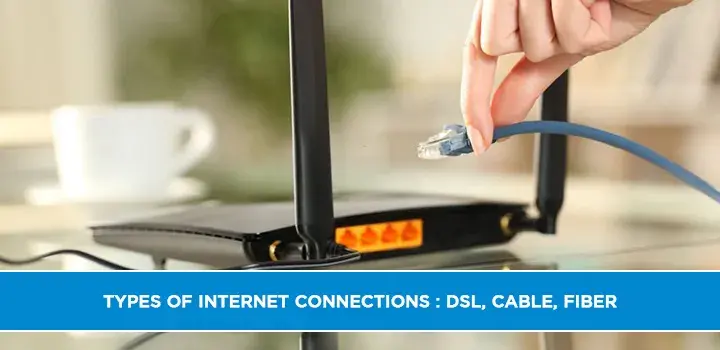Types of internet connections : DSL, Cable, Fiber

In today's world, having an internet connection is a necessity. There are various types of internet connections available, each with its own advantages and disadvantages. In this post, we'll take a look at the three most common types of internet connections: DSL, cable, and fiber. We'll discuss the pros and cons of each type of connection and help you decide which one is best for you. So, let's get started!
Why do you need to know what internet connection type you have?
It's possible that you don't know which internet service provider (ISP) your home uses. You might have moved into an apartment or house with WiFi included, and if so then it will be one of the big three: Spectrum, Sprint/Nextel midst others! Or perhaps there was no choice--you just weren’t involved in choosing them at first since they installed their cables when construction began on this building years ago.
When you have a fast and stable internet connection, it's easy to get lost in the digital world. But if your signal is slow or dropping out of reach, then all those online activities will be much more difficult without a reliable network - especially when doing things like teaching remotely for students who live far away from where they attend school taught by video chat technology!
Can I tell you what type of internet connection I have with the service provider?
There are a few different types of internet connections that you might have, and each one provides different speeds and reliability. You may be able to tell what type of connection you have simply by looking at the service provider's name.
Broadband internet: What does it mean?
Technically, any internet service that is "always on and faster than the traditional dial-up access" can be classified as broadband. That's a pretty broad definition though one which leaves room for most types of claiming they offer high-speed network or not!
Internet service is not a one-size fits all experience. Even the two fastest types of connections, cable vs fiber internet can differ in features such as stability and upload speeds; it's important to do your research when choosing which type will work best for you!
Find out what type of internet connection you have
Do you know what type of internet connection you have? There are a few different types, and it's important to know which one you have in order to get the most out of your internet service. In this post, we'll explain the different types of internet connections and help you determine which one you have. We'll also offer some tips for getting the most out of your connection.
Did you know that there are different types of internet connections? It's true! And knowing which one you have is crucial to getting the most out of your service.
Types of internet connections
If you are looking for the best internet service provider, it is important that before making any decision on which company will meet your needs. To get started with choosing an Internet Connection Type and determine what browsing habits suit them most appropriately based on how much data transfer or speed each type has been shown to provide during testing by website creators like Netflix which streams videos online in order to find out if there's enough capacity left over when streaming video content without affecting webpage loading times too significantly even though this may seem counterintuitive since more people accessing webpages means less room available per visitor.
-
Cable – Spectrum and Xfinity are two of the most popular providers, with Spectrum being recommended for moderate web browser users. They offer streaming videos as well as music downloads to those who want them!
-
Dial-up – For users who enjoy occasional to light browsing, such as budget-friendly consumers looking for an email address that's simple and reliable. The largest provider of these is AOL!
-
DSL – If you enjoy streaming, browsing, and gaming the best providers are AT&T for their moderate speeds of up to 25Mbps download or 1GB uploads per month. CenturyLink offers low pricing on its basic Internet service with 15 gigabytes monthly data limits while Windstream's Clearvoice VoIP phone system can be added at no extra charge!
-
Fiber-optic – The best internet providers are those who provide you with the most bang for your buck. That's why we recommend Verizon Fios, whose fastest speed is twice as fast as other cable or phone companies!
-
Fixed wireless – With AT&T's Fixed Wireless service, you can enjoy streaming services without any buffering or lag. Rise Broadband provides download speeds of up to 20Mbps which makes it perfect for gamers who want an affordable yet dependable provider that won't slow down their gameplay!
Call on (855) 210-8883 & Choose best internet connections now!